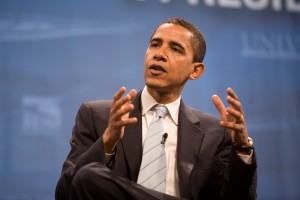In 2012, Candidates Could Struggle to Find the Right Tone on Religion

Last week, Rick Perry gave a long and impassioned speech to an audience at Liberty University, delving into the depth of his Christian faith. Perry spoke openly about his religious convictions and narrated the specifics of his faith history. Both GOP presidential hopeful Mitt Romney and President Barack Obama also addressed the issue of religion last week, but took notably different tacks than Perry.
On Friday, Romney reiterated his claim that his Mormon faith should not be an issue for voters. “I know there are some for whom religion is the most important issue,” said Romney, “and I may lose some of those folks, but for the great majority of Americans, they want to see this country going again.”
Obama, meanwhile, evoked broad religious themes at 9/11 anniversary memorial events and in his speech about his new national jobs bill.
Cathy Lynn Grossman writes for USA Today,
On Sunday, Obama recited Psalm 46 at the 9/11 memorial event in New York and quoted Psalm 30 that same night at a memorial concert at the Kennedy Center in Washington. In his televised national jobs bill speech, he declared, We are one nation under God, we always have been and always will be.
Perry’s speech was clearly designed to leave his listeners with an intimate glimpse of his religious journey. But Romney and Obama, while acknowledging the importance of religion in the 2012 campaign, are taking a much less personal approach. These approaches reflect the different challenges each face heading into the 2012 campaign.
Romney’s challenge is that his Mormon faith could be a liability (recent PRRI data shows that 72% of Americans see the Mormon faith as different from their own and 41% say they do not consider Mormons to be Christian).
Obama must navigate a religiously diverse public as president and a more diverse Democratic Party as a candidate. This is in stark contrast to Perry, who can focus on communicating with a homogeneous evangelical base in the Republican Party.
But that doesn’t mean that everything’s sunshine and roses for Perry, who must gauge whether his strategy of strongly identifying with one subgroup in the American religious landscape, white evangelical Christians, will hurt him in the general election.
All of these hurdles prove that religion will only become more important as we move into the general election. The question is which candidate, when thrust onto the national stage, will handle these tests most gracefully.

